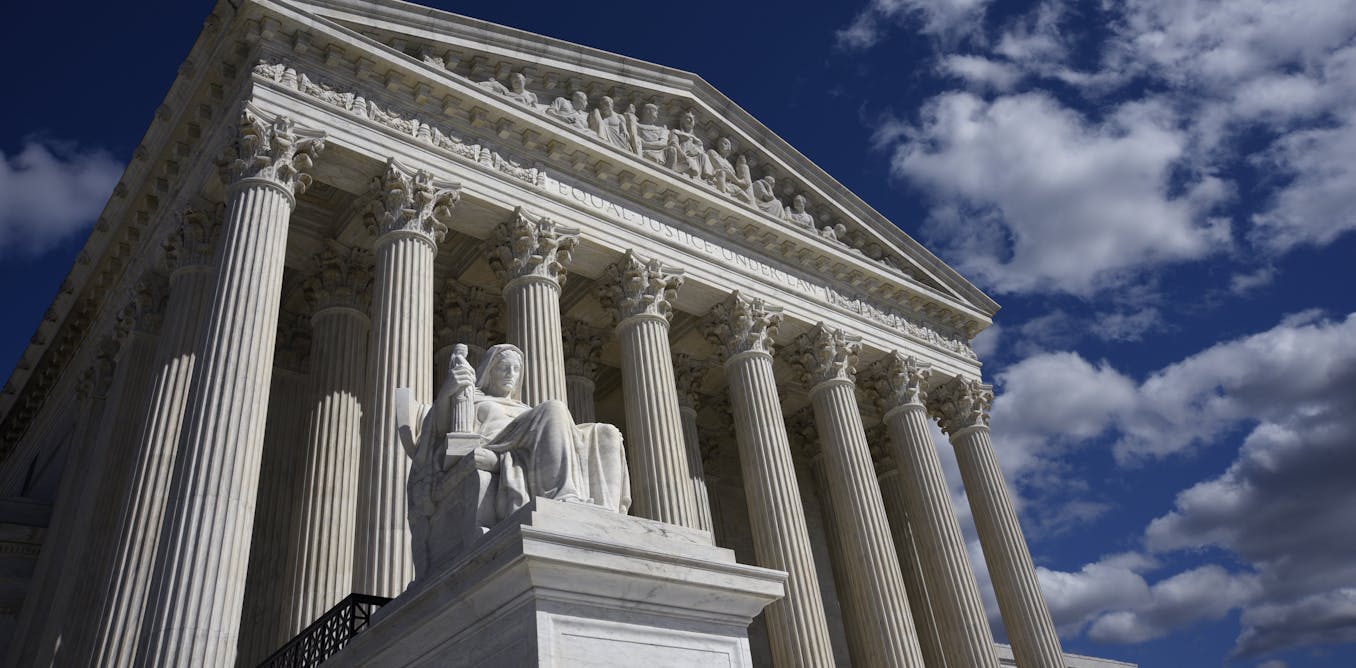In two big rulings this previous month, the U.S. Supreme Court docket curtailed the authority of federal agencies to draft and implement guidelines that affect the nation’s money health. 1 vital agency, the Securities and Trade Fee, took a especially significant hit.
Talking as an individual who has researched financial shenanigans for virtually 50 decades, I’m involved that these rulings will backfire on markets and traders.
Taken collectively, they could direct to watered-down laws, weakened enforcement and much less oversight of the nation’s monetary markets and public businesses. I panic that they could ultimately be a major aspect in a future current market crash.
In one particular situation, Securities and Trade Commission v. Jarkesy, the court rebuked the SEC — the company that guards buyers from fraud — for utilizing in-residence proceedings to discipline firms and others for breaking securities rules. Now, the SEC will have to have to convey accused securities fraudsters to federal courtroom, which could be extra complicated and costly.
And in the other scenario, Loper Vivid Enterprises v. Raimondo, the court cut back sharply on a very long-standing doctrine — the Chevron rule — that gave agencies significant liberty to craft principles and polices, particularly when the fundamental law might be ambiguous. As a outcome, federal organizations, like the SEC, have considerably less electricity to act, ceding that ability to lengthier and costlier demo proceedings.
Extra levels of concealed danger for investors
Each decisions could have an impact on the nation’s economic perfectly-getting. Traders who count on the disclosure principles and the enforcement mechanisms of the SEC for protection – now topic to legal challenge – are about to be saddled with an more layer of concealed danger not seen in many years – in unique, extra questionable accounting practices in their regulatory filings.
Recall that in 1933 and 1934, Congress set up the SEC in the aftermath of the Terrific Depression. What followed in the ensuing decades was the development of fewer dangerous and additional informed marketplaces.
Bettmann/Getty Photos
Buyers could also count on current market selling prices to efficiently and unbiasedly mirror all public information and facts, somewhat than have to pore about intricate fiscal statements. This led to the U.S. marketplaces turning into the most desirable place in the globe for funds to commit in risky small business initiatives.
The SEC later bolstered money markets with measures underneath the Dodd-Frank Act of 2010 to rectify other excesses — this sort of as extremely generous credit scores — that arguably contributed to the 2007–2008 Good Recession. Right now, many thanks to comprehensive disclosure necessities and rather economical enforcement mechanisms, the U.S. has possibly the healthiest and most strong economic markets ever.
A new obstacle to enforcement
Healthy and sturdy economical markets really do not run out of altruism, nonetheless.
Monitoring and enforcement mechanisms are pivotal. Although the SEC depends partly on the private sector to spot and discipline errant administrators for violations of the securities rules – for case in point, through federal and state securities class motion litigation – a lot of the work relies on the enforcement division of the SEC.
In specific, the SEC takes advantage of “accounting and auditing enforcement releases,” or AAERs, to ensure that companies preserve a clean set of books. Due to the fact 1995, the SEC has issued 3,266 AAERs, primarily to accurate accounting and auditing deficiencies in company money statements. Various research ensure AAERs as evidence of fiscal fraud.
AAERs are also a very effective form of enforcement — and much significantly less pricey than a non-public securities course action lawsuit. Companies typically agree to settle the allegations of wrongdoing with out admission of legal responsibility by getting well timed measures to strengthen accounting and auditing and paying out fines and penalties.
The payments have been sizeable. For case in point, for 760 enforcement steps in 2022, firms paid out as significantly as US$6.4 billion to the SEC. The announcement of an AAER motion is also high-priced for the firm’s shareholders, with inventory selling prices falling 50% more than the up coming six months adhering to an AAER announcement, in accordance to scientists.
But the Jarkesy ruling could alter anything. I do not see why any publicly traded business would agree to settle an AAER motion with fines and sanctions now that it can obstacle the SEC’s arguments in a court docket of law.
The risk of enforcement by courts
What may well be the consequence of getting rid of or paring back the SEC’s key software of enforcement?
The threat is quite possibly reverting to an setting like 1928 or 2007. That is simply because the ruling will effectively minimize the cost of accounting or auditing violations for would-be or actual violators. It shifts the purview of deciding penalties and fines to the courts relatively than in-residence proceedings by the SEC, expanding the value of enforcement to the SEC.
In limited, businesses will stress much less about a long term AAER investigation.
In addition, despite auditors’ endeavours to ensure that publicly traded monetary and expenditure companies continue to keep a clean up established of guides based mostly on commonly recognized accounting rules, or GAAP, there is even now a lot place for option, such as higher use of non-GAAP accounting principles. With fewer enforcement, the Jarkesy ruling will motivate a lot more imaginative accounting, not considerably less.
That creativeness presently skews toward optimistic earnings reports. The vast greater part of earnings releases now exceed analysts’ forecasts — 77% for the S&P 500 in the very first quarter of 2024. What’s more, my individual investigation implies that it is not just that earning reviews exceed analysts’ forecasts, but the dollar measurement of firms’ beneficial earnings surprises has grown steadily about the previous decade, which is a different hidden hazard.
Much less scrutiny, much more lengthy-phrase risks
Some securities legal professionals say the Jarkesy selection will not improve the SEC’s habits, due to the fact the company has progressively shifted proceedings to normal courts.
Whilst that’s genuine for some steps, I feel the premier impression will lie in SEC actions not yet undertaken. Companies and the SEC will act in another way in the future since Jarkesy can make SEC enforcement action additional high-priced and far more unsure.
Hope far more endeavours by firms to present their economic general performance in the most glowing terms feasible, figuring out that the price of SEC enforcement has just increased and the detection probability and anticipated cost to a company of violating commonly recognized accounting concepts or generally accepted auditing benchmarks has just diminished.
Although not all students agree, there are two important durations in the fiscal history of the United States when a monetary meltdown transpired that was in component plausibly thanks to shoddy accounting and reporting – the Good Despair of 1929 and the Wonderful Recession of 2007–2009.
In the yrs or many years in advance, ought to the country experience an additional serious economical disaster major to a economic downturn, it will be more challenging to blame the accountants and financial investment bankers. As an alternative, interest might change to two mid-2024 courtroom selections and the justices who wrote them.




